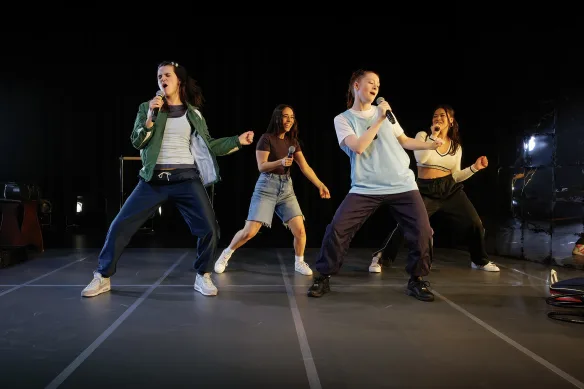Entering the Lennox Theatre of Parramatta’s Riverside Theatre, the collective excitement from the audience bounced off the floor-to-ceiling mirror that sat on the stage. Girl Band – a play years in the making, that effortlessly marries the universal experiences of young womanhood with 1990s Spice Girls nostalgia – was beginning. I must admit that I had been looking forward to this opening night for weeks. Although a child of the 2000s, I fondly remember dancing to Spice Up Your Life at 10th birthday parties, Year 7 athletics carnivals, and holidays with my sister in the car on a road trip. I was eager to hear those ‘90s bangers.
Girl Band did not disappoint. With FILA track pants, tank tops, and scrunchies, the play was all Spice Girls and much, much more.
Written by award-winning playwright Katy Warner and directed by the award-winning Lucy Clements, Girl Band follows the story of the five female members of the group The Sensation Girls, as well as their manager and wannabe member, Becky (Amy Hack). The play was produced by the New Ghosts Theatre Company, an award winning arts organisation which strives to champion new voices, empower creatives, and present new Australian stories — particularly those stories of women and gender diverse people. With all cast and crew members being women and non-binary people, the play authentically depicted the diverse and often universal experiences of womanhood in an inherently patriarchal world.
Indeed, according to the playwright, Girl Band was written not only as a ‘90s fan-girl piece packed with “butterfly clips and low-rise jeans” but also to “[shine] a light on how far we’ve come but, even more importantly, how far we’ve still got to go. How little things have actually changed in 30 years.” Warner is referring to the underlying message of the play: in exploring the lives of those women who venture into the male-dominated music industry, Girl Band powerfully challenges the exploitation of women in this industry and amplifies female empowerment. We are ultimately asked to question whether our society still values women for our music or just for our appearance and bodies.
Set in 1994, The Sensation Girls clearly echo the characters of the Spice Girls. From the first scene, we are immediately introduced to the “smiley” MJ (LJ Wilson), the “smart” Jade (Chaya Ocampo), the “sexy” Stacey (Jade Fuda), and the “strong” Sammy (Meg Clarke). These fab four are soon shocked to discover that their group leader and friend, the “sassy” DeeDee is “on a plane,” having been offered a solo contract at “the London studio.” The Sensation Girls are then introduced to the kind and feisty Kathleen, or Kiki (Madeleine Marie Dona) as she is rebranded to, as DeeDee’s replacement. The remainder of the play follows The Sensation Girls on their journey from singing songs like “Boys, Boys, Boys” while being managed by Becky, who is ultimately under the command of the money-making misogynists Darren and Craig, to eventually writing their own music that voices their concerns as young women. It is only by the end of the play that The Sensations Girls move away from being just a group – a collective of poster girls who perform songs – to a band, or agentic musicians who compose their own lyrics and chords.
Although the play could have purely been a Spice Girls fan piece – which in many respects, it is – Girl Band hits much deeper in interweaving complex storylines that showcase the often universal experiences of being a young woman. From coping with eating disorders to the unbreakable bond of female friendship, the impact of sexual assault to aiming to find one’s assertive voice in our patriarchal world, Girl Band certainly struck a chord with my fellow audience members, particularly young women and non-binary audience members like myself. As the play highlights, the stresses and joys of being in a ‘girl band’ – almost metaphoric for being a female-identifying person in society – transcend time. Although set in 1994, the play could have been easily set in 2023. If this was the case, however, I’m not sure if the ‘90s bangers would be as prominent.
Everything about the production of Girl Band was spot on. The simplistic yet highly effective stage design – the only prominent objects on stage were a large, suspended dance-studio-esk mirror, a ballet barre, and a small table set with a ginormous ‘90s CD player – allowed the audience to focus on the characters and their often outrageous costumes that were delivered by Craig and Darran. These costumes, including yellow hot-pants, a plethora of crop tops, and majorly high heels, epitomised the costumes that women in the music industry have been traditionally required to wear – namely, clothes that show off “ripped arms and torsos,” boobs, and bare legs. These “sexy” costumes were heavily contrasted against the everyday clothes of the five leads, being denim overalls, trackies, and long shorts. This costume contrast emphasises how much of the music industry remains focused on women’s bodies and not women’s music. The highlight of the play was definitely the music. Original songs composed by Zoe Rinkel satisfied my ‘90s nostalgia and were taken with me on the train ride home. The actors skillfully sung and danced to these songs in full ‘90s girl group fashion, with symmetry and harmony of each song and corresponding dance on point.
Perhaps one of the most notable lines from Girl Band was not in the play itself but in a speech delivered by Warner at the after party. The playwright stated that “at its heart, Girl Band is a play about friendship, about humans supporting humans.” This message certainly shone through the play’s dazzling earrings and sparkly tank tops, reminding us of the power of working together to get what we really, really want.





